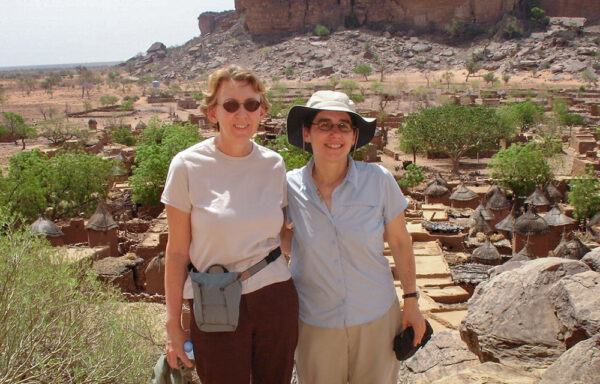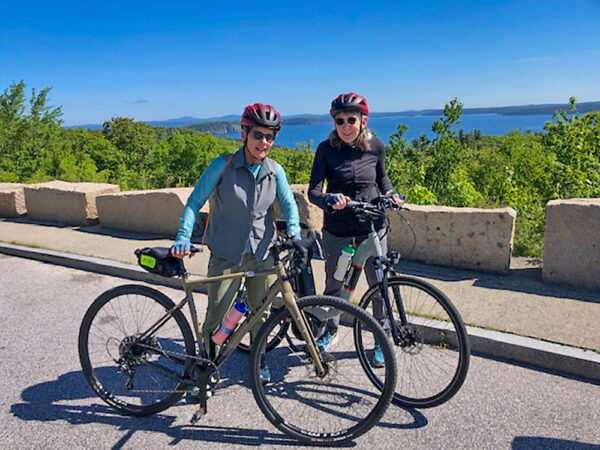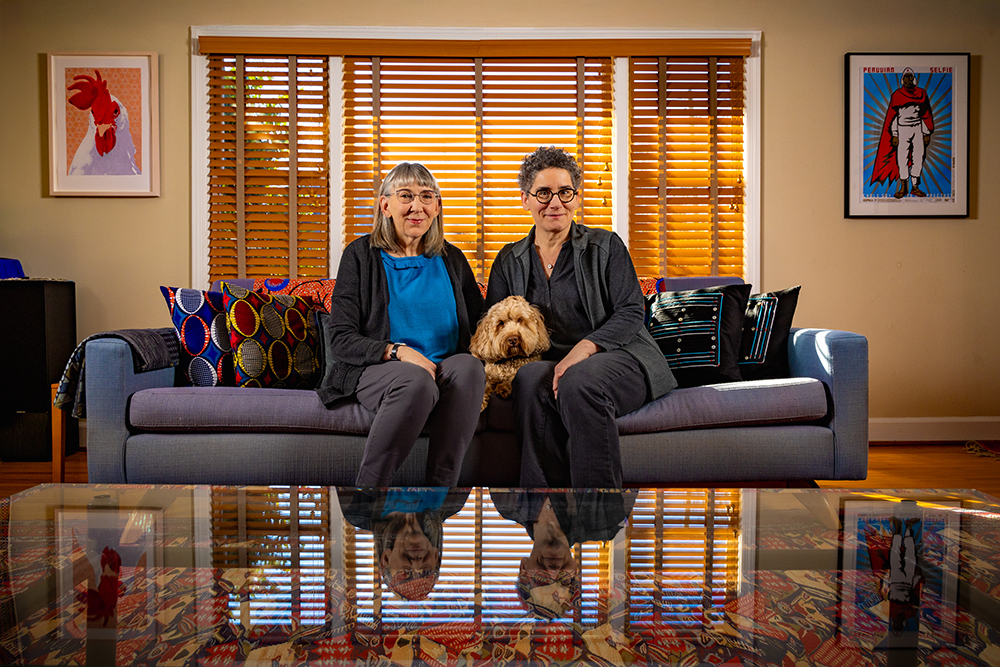The cliffs of central Mali loomed before them — breathtaking, rugged, and unforgiving under the scorching sun. Florence Babb and Victoria Rovine, who had come here for Rovine’s research on African textiles, were taking a break from work. But their afternoon adventure quickly turned into an unexpected test of endurance.
“We were hiking on those rocks,” recalls Rovine, a UNC-Chapel Hill art history professor. “Florence was wearing sneakers, and the heat was so intense that her shoes literally melted. The soles just peeled right off!”
With every step, Babb’s shoes clapped against the rocks, making it nearly impossible for her to move.
“It was very, very difficult to walk,” admits Babb, a Latin American studies and anthropology professor. “You definitely needed proper footwear on those cliffs.”
Without hesitation, Rovine swapped shoes with Babb and the couple continued their trek.
“It was a grand gesture,” Babb says. “Vicki’s a little younger and also a bit more surefooted, so I’ve always appreciated this story.”
For Rovine and Babb this moment is more than just a funny anecdote. It’s a metaphor for their relationship: supporting each other, adapting to challenges, and always finding a way forward, step by step.
They met in the mid-’90s while working at the University of Iowa (UI). Over their nearly 30-year relationship, they have navigated careers at three different universities, and their research has taken them across the world — Babb to Peru, Nicaragua, Mexico, and Cuba, and Rovine to Mali, Senegal, Ghana, and South Africa.
Babb researches gender, race, sexuality, cultural politics, and travel and tourism in Latin America and the Caribbean. She has conducted extensive ethnographic studies examining how marginalized groups — especially women and Indigenous peoples — experience economic and political transformations. She also analyzes how social inequalities and social justice shape identities and power dynamics in contemporary society.
Rovine — also director of Carolina Public Humanities — studies African art, textiles, fashion, and how clothing shapes identity, history, and cultural expression. She explores the intersection of tradition and modernity in African design, uncovering how textiles and dress function as forms of communication, resistance, and innovation. Her work also delves into how African visual culture influences and interacts with global fashion and art movements.
“Our work has given us interesting lives,” Babb says. “We’ve been fortunate to travel to places that we care about and fascinate us — places we believe are important to understand, write about, and engage with others who have similar interests.”
Navigating two careers
The pair met in 1995 at a dinner reception at UI, where Babb was a longtime faculty member in anthropology and women’s studies and Rovine was a recently hired curator of African art at the UI Museum of Art. Rovine was also finishing up her PhD at that time, and Babb was raising her young son, Daniel.
“I remember noticing Vicki and that she was a newcomer,” Babb recalls. “We sat at the same table and got acquainted. And after that, gradually over time, we became good friends and then it turned more romantic by 1998.”
In 2003, the two had been together for about five years when Babb received an offer for an endowed professorship at the University of Florida. They knew their next move would be together, so they needed to find an opportunity for Rovine, who had completed her PhD and published her first book.

In 2006, Babb and Rovine visited the Dogon region of Mali for one of Rovine’s research projects. (photo courtesy of Florence Babb)
For dual-career academic couples, securing faculty positions at the same institution can be a game-changer. While some universities have spousal hiring policies, these opportunities don’t always work out. The possibility of being hired when a spouse secures a position is a unique but rare opportunity, one that Rovine deeply appreciates.
Fortunately, Rovine had colleagues at Florida who were enthusiastic about advocating for her, and she was offered an assistant professorship in art history and African studies, her first faculty position.
“Vicki is the ace up my sleeve, because once I have an offer, I say, ‘But, you know, there’s also my wife Vicki Rovine, and look what she could bring,’” Babb explains with a smile. “And as time goes on, certainly, they know they’ve made the right decision.”
The couple moved again in 2014, this time to Carolina, where they each accepted faculty positions. Even though they’ve successfully navigated this process twice, Rovine remains humbled by the experience.
“I hoped it would work out, but I never took it for granted — and it’s incredible that it happened twice,” Rovine says. “I’ve been happy at both places, but I love it here and I never want to move again.”
Teaching through collaboration
While at UI, the intersection of Babb and Rovine’s academic expertise led to a unique opportunity — co-teaching a graduate seminar titled “Culture and Identity on the Global Market.” The course focused on art, culture, and tourism in Latin America and Africa, the commodification of artifacts and artworks, and the implications for people’s identities.
In the class, which they taught again as an undergraduate seminar at UF, Rovine addressed visual art and material culture, while Babb explored questions of cultural identity through an ethnographic perspective. But teaching as a team required a delicate balance.
“It’s like a dance,” Babb says with a laugh. “Sometimes it’s scripted — you know who’s handling what. Other times, you have to navigate when to pass the ball.”
Rovine agrees. “It was fun. It was a chance to bring together readings and themes we were passionate about, and the students responded well.”
The pair considers their partnership a strength that has benefited the student experience.
“We bring some of those student stories home to each other and probably all to the good, in a sense, that the students get that much more attention,” Babb says.
Writing in the margins
For Babb and Rovine, academic collaboration extends beyond the classroom and into their writing lives.
“We trust one another to offer close readings and essential feedback on just about everything we write before sending material out for publication,” Babb says.
Their approach to reviewing each other’s work is rooted in mutual respect and a deep understanding of each other’s thought processes.
“I’ll put something in the margin like, Have you thought about it this way, or could you describe this more, or have you thought about the political angle of this cultural question?” Babb shares.
And Rovine does the same for Babb.
“We’re in different disciplines, so our research pursuits are quite distinct,” Rovine notes. “Occasionally, I’ll ask Florence, ‘Didn’t so-and-so write something about this?’ if I’m trying to cite something, but our research pursuits are so different that it’s not a matter of writing together.”

Rovine and Babb, both enthusiastic bikers, during a recent bike tour in Maine. (photo courtesy of Florence Babb)
Still, their intellectual synergy is undeniable. The two will likely have more reviewing in the future, as both are working on individual book projects. Babb, who retired from Carolina in July 2024, is continuing her research in Peru and plans to have a new book out in the next couple of years on perceptions of gender and racial difference across several rural and urban research sites.
Rovine is currently on sabbatical to write her third book, about cotton and French colonialism in West Africa, focusing on the French administration’s failed attempts to control their colonies’ cotton through agriculture and weaving, which are related to dress and culture.
They also plan to pursue more travel. Avid bikers, they have cycled all over the world and will visit Tuscany in May for a tour.
“We also love being at home together with our much-adored dog, Harry,” Babb adds.
Both agree they have benefited from having an academic as a spouse.
“Being an academic comes with a privileged lifestyle,” Rovine admits. “But so much of it is working all the time. An advantage to both people in a couple being academics is you really understand each other’s challenges, frustrations, and achievements. You can talk to each other and understand each other’s professional lives in a deeper way.”


